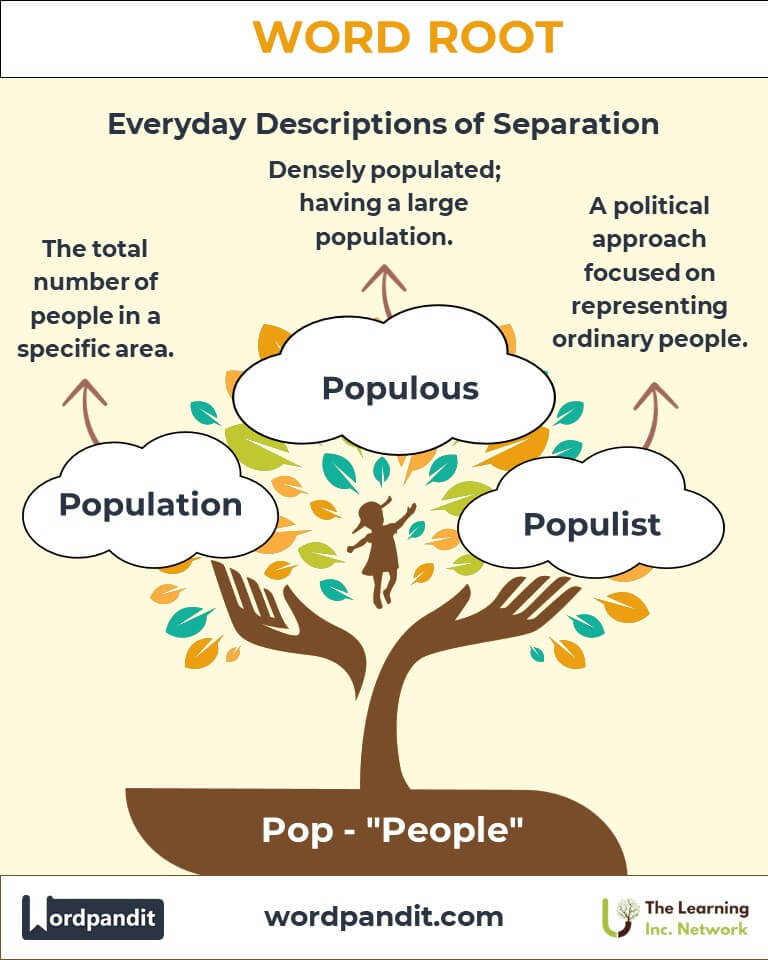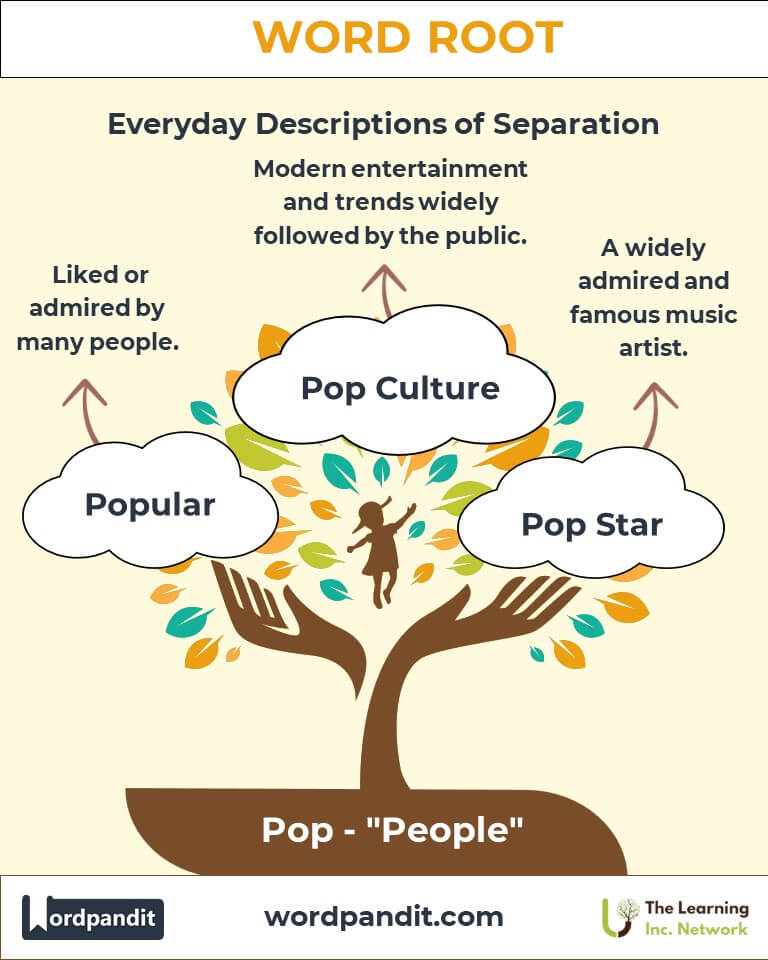Pop: The Root of People and Popularity
Dive into the fascinating world of the root "Pop," derived from Latin, meaning "people." From "population" to "popular," this root resonates deeply in words that describe communities, trends, and collective experiences.

Table of Contents
- Introduction: The Essence of "Pop"
- Etymology and Historical Journey
- Mnemonic: Unlocking the Power of "Pop"
- Common "Pop"-Related Terms
- "Pop" Through Time
- "Pop" in Specialized Fields
- Illustrative Story: "Pop" in Action
- Cultural Significance of "Pop"
- The "Pop" Family Tree
- FAQs about the "Pop" Word Root
- Test Your Knowledge: "Pop" Mastery Quiz
- Conclusion: The Living Legacy of "Pop"
1. Introduction: The Essence of "Pop"
The root "Pop," pronounced "pop," stems from the Latin word populus, meaning "people." It forms the backbone of words that capture the spirit of human communities and their collective actions. Whether describing the population of a nation or the popularity of a trend, "Pop" reminds us of the importance of human connection in language and life.

2. Etymology and Historical Journey
The root populus traces back to classical Latin, symbolizing the collective identity of people. It appears in Roman phrases like Senatus Populusque Romanus (The Senate and People of Rome), showcasing its civic importance. As Latin evolved into modern languages, "Pop" found its way into English, giving rise to terms like "population" and "popular," reflecting societal structures and cultural trends.
3. Mnemonic: Unlocking the Power of "Pop"
To remember "Pop," visualize a bustling city square filled with people, symbolizing community and shared experience.
Mnemonic Device: "Pop connects people, from populous cities to popular ideas."
4. Common "Pop"-Related Terms
- Population (pop-yoo-lay-shun): The total number of people living in a specific area.
Example: "The population of the city has doubled in the last decade." - Popular (pop-yoo-lur): Liked or admired by many people.
Example: "The song became popular worldwide within days of its release." - Populous (pop-yoo-luhs): Having a large population; densely populated.
Example: "India is one of the most populous countries in the world." - Populist (pop-yoo-list): A political approach that strives to represent the interests of ordinary people.
Example: "The leader's populist agenda appealed to the working class." - Pop Culture (pop kul-cher): Modern popular culture transmitted through mass media.
Example: "Pop culture often reflects the trends and values of society."
5. "Pop" Through Time
Populus (Ancient Rome): Initially tied to civic identity, it underscored the unity of the Roman people.
Popularity (Renaissance): During this period, "popular" began to describe widespread admiration, particularly in art and literature.
Pop Culture (20th Century): The rise of mass media gave birth to "pop culture," encompassing music, films, and fashion, making "Pop" a symbol of modern collective identity.
6. "Pop" in Specialized Fields
- Demography: Population Density: Measures people per unit area.
- Politics: Populism: Emphasizes representing the people against elites.
- Media: Pop Star: A widely admired music artist.
- Economics: Pop Economy: Reflects market trends driven by mass consumption.
Illustrative Story: "Pop" in Action
In a small town, Maria dreamed of creating a community garden. She rallied the population, gaining widespread support for her popular idea. With the help of populist leaders, the town transformed an abandoned lot into a flourishing garden. The project became a symbol of unity, celebrated in local pop culture. Maria's success demonstrated the power of "Pop" to bring people together for a common cause.
Cultural Significance of "Pop"
The root "Pop" reflects the collective spirit of humanity. From ancient Rome’s civic pride to modern pop culture, it underscores our shared experiences. Whether through politics, art, or daily life, "Pop" captures the essence of what it means to connect as a community.

The "Pop" Family Tree
- Dem (Greek: people):
- Democracy: Rule by the people.
- Demographics: Statistical study of populations.
- Soci (Latin: companion):
- Society: A group of individuals forming a community.
- Sociable: Friendly and outgoing.
- Civ (Latin: citizen):
- Civil: Relating to citizens.
- Civilization: An advanced state of human society.

FAQs About the "Pop" Word Root
Q: What does "Pop" mean?
A: The root "Pop" is derived from the Latin word populus, meaning "people." It forms the basis of numerous words that refer to communities, crowds, or human collectives, such as "population" and "popular."
Q: What is the difference between "Population" and "Populous"?
A: While both relate to people, "population" refers to the number of individuals in a particular area (e.g., "The population of the city is 1 million"), whereas "populous" describes an area that is densely populated (e.g., "New York City is a populous metropolitan area").
Q: What does "Pop Culture" mean?
A: "Pop Culture," short for "popular culture," refers to the trends, entertainment, and ideas widely accepted and consumed by the masses. It includes music, movies, fashion, and social phenomena that shape societal preferences.
Q: How does the term "Popular" relate to "Pop"?
A: "Popular" originates from the root "Pop" and means something widely liked or favored by a large group of people. For example, a popular book or movie gains widespread admiration due to its appeal to the general population.
Q: What is a "Populist"?
A: A "populist" is a political figure or movement focused on representing the common people's interests, often contrasting with the elite. For instance, populist leaders might address economic disparities to garner support from the working class.
Q: How is "Pop" used in science?
A: In science, "Pop" is frequently used in fields like demography, where terms such as "population density" (the number of people per unit area) and "population growth" (the increase in the number of individuals over time) are critical for studying human and animal communities.
Test Your Knowledge: "Pop" Word Root Quiz
1. What does the root "Pop" mean?
2. Which word describes the total number of people in an area?
3. What does "Populous" mean?
4. What is "Pop Culture"?
5. What does a "Populist" aim to do?
12. Conclusion: The Living Legacy of "Pop"
The root "Pop" bridges the ancient and modern, capturing the essence of people and their collective identities. From historical civilizations to today’s vibrant pop culture, this root reflects humanity's enduring connections. Explore "Pop"-related terms to deepen your understanding of our shared linguistic and cultural heritage.














